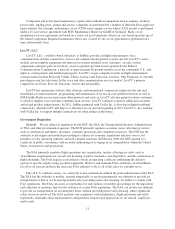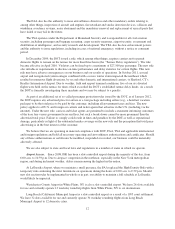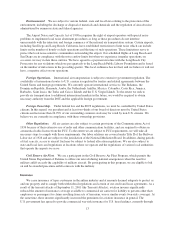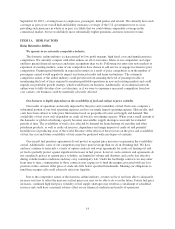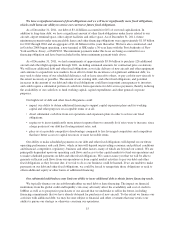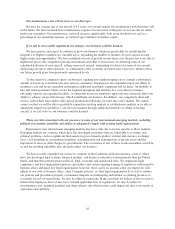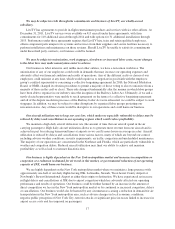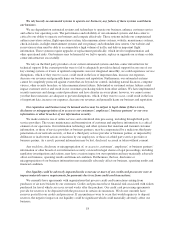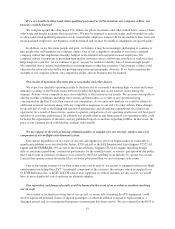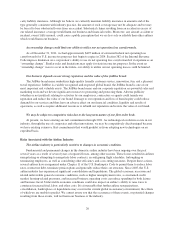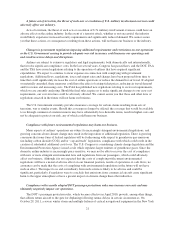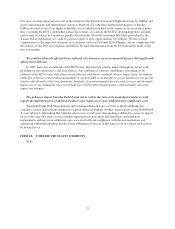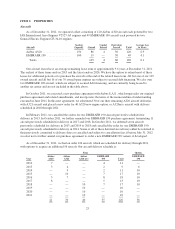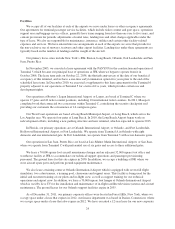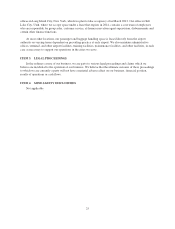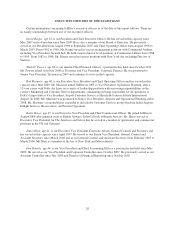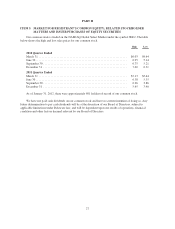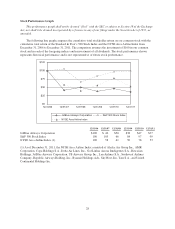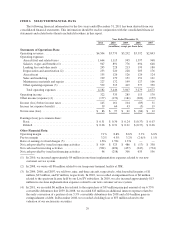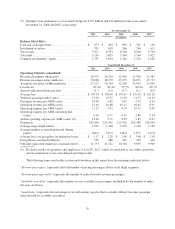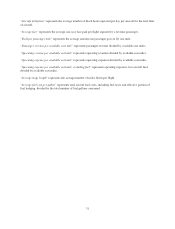JetBlue Airlines 2011 Annual Report Download - page 31
Download and view the complete annual report
Please find page 31 of the 2011 JetBlue Airlines annual report below. You can navigate through the pages in the report by either clicking on the pages listed below, or by using the keyword search tool below to find specific information within the annual report.A future act of terrorism, the threat of such acts or escalation of U.S. military involvement overseas could
adversely affect our industry.
Acts of terrorism, the threat of such acts or escalation of U.S. military involvement overseas could have an
adverse effect on the airline industry. In the event of a terrorist attack, whether or not successful, the industry
would likely experience increased security requirements and significantly reduced demand. We cannot assure
you that these actions, or consequences resulting from these actions, will not harm our business or the industry.
Changes in government regulations imposing additional requirements and restrictions on our operations
or the U.S. Government ceasing to provide adequate war risk insurance could increase our operating costs
and result in service delays and disruptions.
Airlines are subject to extensive regulatory and legal requirements, both domestically and internationally,
that involve significant compliance costs. In the last several years, Congress has passed laws, and the DOT, FAA
and the TSA have issued regulations relating to the operation of airlines that have required significant
expenditures. We expect to continue to incur expenses in connection with complying with government
regulations. Additional laws, regulations, taxes and airport rates and charges have been proposed from time to
time that could significantly increase the cost of airline operations or reduce the demand for air travel. If adopted
or materially amended, these measures could have the effect of raising ticket prices, reducing air travel demand
and/or revenue and increasing costs. The FAA has published new regulations relating to crew rest requirements,
which we are currently analyzing. Should the final rules require us to make significant changes to our crew rest
requirements, our cost structure could be adversely affected. We cannot assure you that these and other laws or
regulations enacted in the future will not harm our business.
The U.S. Government currently provides insurance coverage for certain claims resulting from acts of
terrorism, war or similar events. Should this coverage no longer be offered, the coverage that would be available
to us through commercial aviation insurers may have substantially less desirable terms, result in higher costs and
not be adequate to protect our risk, any of which could harm our business.
Compliance with future environmental regulations may harm our business.
Many aspects of airlines’ operations are subject to increasingly stringent environmental regulations, and
growing concerns about climate change may result in the imposition of additional regulation. There is growing
consensus that some form of federal regulation will be forthcoming with respect to greenhouse gas emissions
(including carbon dioxide (CO2)) and/or “cap and trade” legislation, compliance with which could result in the
creation of substantial additional costs to us. The U.S. Congress is considering climate change legislation and the
Environmental Protection Agency issued a rule which regulates larger emitters of greenhouse gases. Since the
domestic airline industry is increasingly price sensitive, we may not be able to recover the cost of compliance
with new or more stringent environmental laws and regulations from our passengers, which could adversely
affect our business. Although it is not expected that the costs of complying with current environmental
regulations will have a material adverse effect on our financial position, results of operations or cash flows, no
assurance can be made that the costs of complying with environmental regulations in the future will not have
such an effect. The impact to us and our industry from such actions is likely to be adverse and could be
significant, particularly if regulators were to conclude that emissions from commercial aircraft cause significant
harm to the upper atmosphere or have a greater impact on climate change than other industries.
Compliance with recently adopted DOT passenger protections rules may increase our costs and may
ultimately negatively impact our operations.
The DOT’s passenger protection rules, which became effective in April 2010, provide, among other things,
that airlines return aircraft to the gate for deplaning following tarmac delays in certain circumstances. On
October 29, 2011, a severe winter storm and multiple failures of critical navigational equipment in the New York
21


